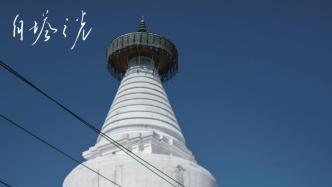
This year's 73rd Berlin Film Festival ushered in the "big year" of Chinese-language films. A total of 15 Chinese-language films competed in each section of the festival. The main competition "The Light of the White Tower" was the first to debut and completed its world premiere in Berlin on February 18.
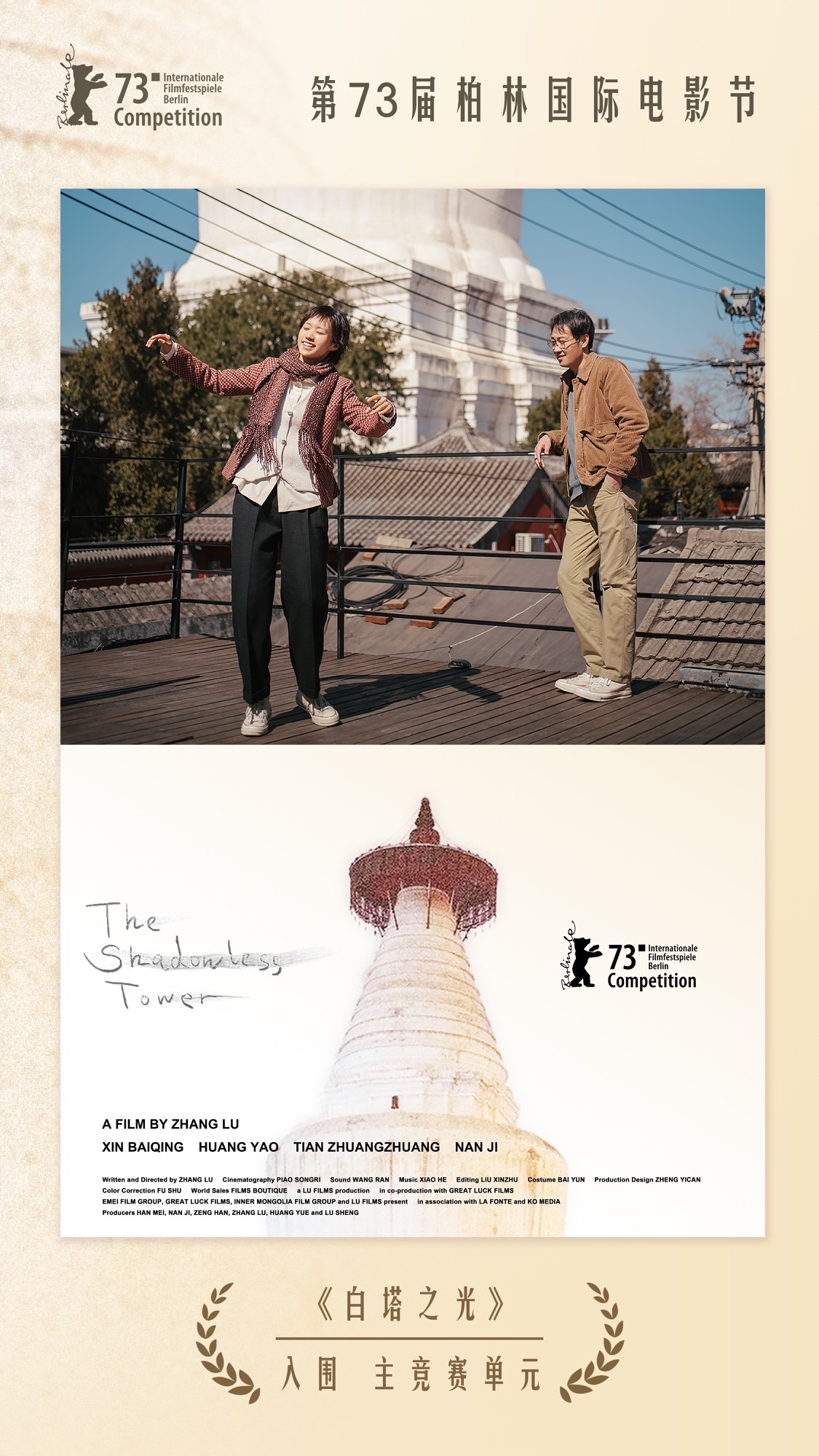
"The Light of the White Tower" was shortlisted for the poster of the main competition unit of the Berlin Film Festival
This film directed by Zhang Lv and starring Xin Baiqing, Huang Yao and Tian Zhuangzhuang tells the story of Gu Wentong, a middle-aged man who lives alone, and meets young photographer Ouyang Wenhui at work. With her encouragement, he chooses to face the loss with himself. The father who has been in contact for many years regains the long-lost father-son relationship.
Director Zhang Lu lived in South Korea for many years before, and most of the films he shot were based on local materials overseas. "The Light of the White Tower" is a film created by Zhang Lu for Beijing after returning to China. As a frequent visitor to the International Film Festival, this is the fourth time that Zhang Lu has been shortlisted in Berlin, and it is also the first time he has returned to the Berlin main competition after "Desert Dream" in 16 years.
"The Light of the White Tower" continues Zhang Lu's style of using casual dialogues in a specific space to connect the subtle and depressive relationships of people who are dissociated in it. At the same time, the discussion of an imperceptible meaning of "family" also triggered discussions among the first batch of professional audiences who watched the film.
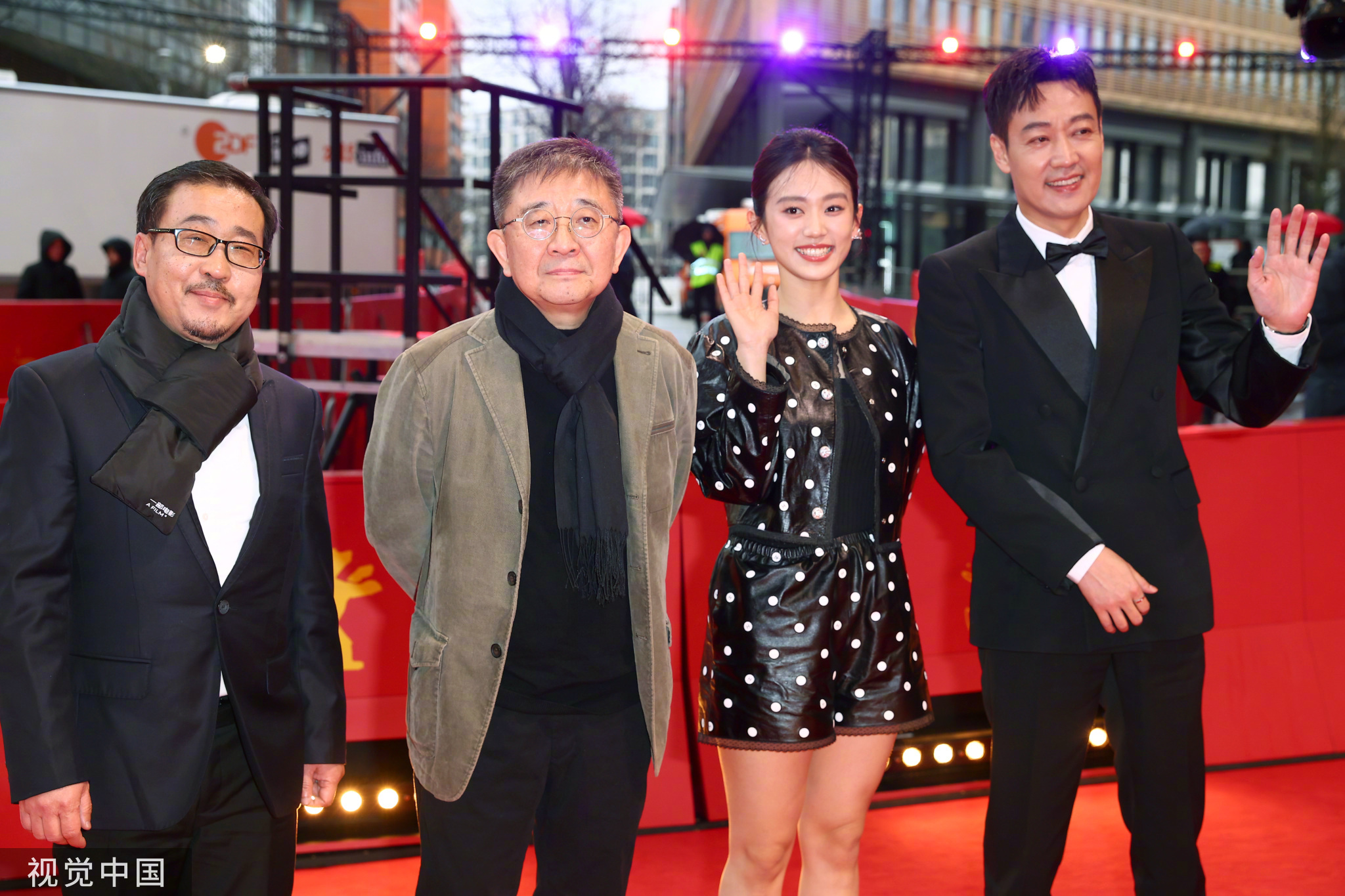
"The Light of the White Tower" Berlin Film Festival premiere, from left to right: Wang Hongwei, Zhang Lu, Huang Yao, Xin Baiqing appeared on the red carpet. Visual China Map
"Variety" commented, "There are so many events and observations in the film, we only subtly notice the overall design of director Zhang Lv: a relationship that may be connected in the future is faltering before it even begins, and another Relationships that were once broken are being carefully repaired. "The Light of the White Tower" is so smart and true to the extremely unpredictable winds of fate that it cannot be said that everything will always be so perfectly balanced. But it does show that middle-aged life is both Comfortable, but also disappointing. When we are aware of the invisible and intricate connections, with the past, with the people in our lives, and with the places we call home, there is always a sense of comfort."
"Le Polyester" said, "There is no trace of cruelty in Zhang Lu's gaze. It is complex but nuanced, living up to the protagonists of his films. In this case, family relations are very contradictory...not so much a redistribution of family roles , rather a strange and profound paradox: "The Light of the White Tower" powerfully portrays a family without a family."
"Filmstarts" believes that "director Zhang Lv has developed a delicate network of relationships around the film's protagonist Gu Wentong with an almost floating posture of lightness, which is rare in cinema. "The Light of the White Tower" is not about a person It is not a huge shadow left behind, but a collection of many, many small shadows about all the moving and tragic complexities that make up life."
Before the premiere of the film, film scholar Li Xun and director Zhang Lu conducted an in-depth interview on the creation of "The Light of the White Tower".
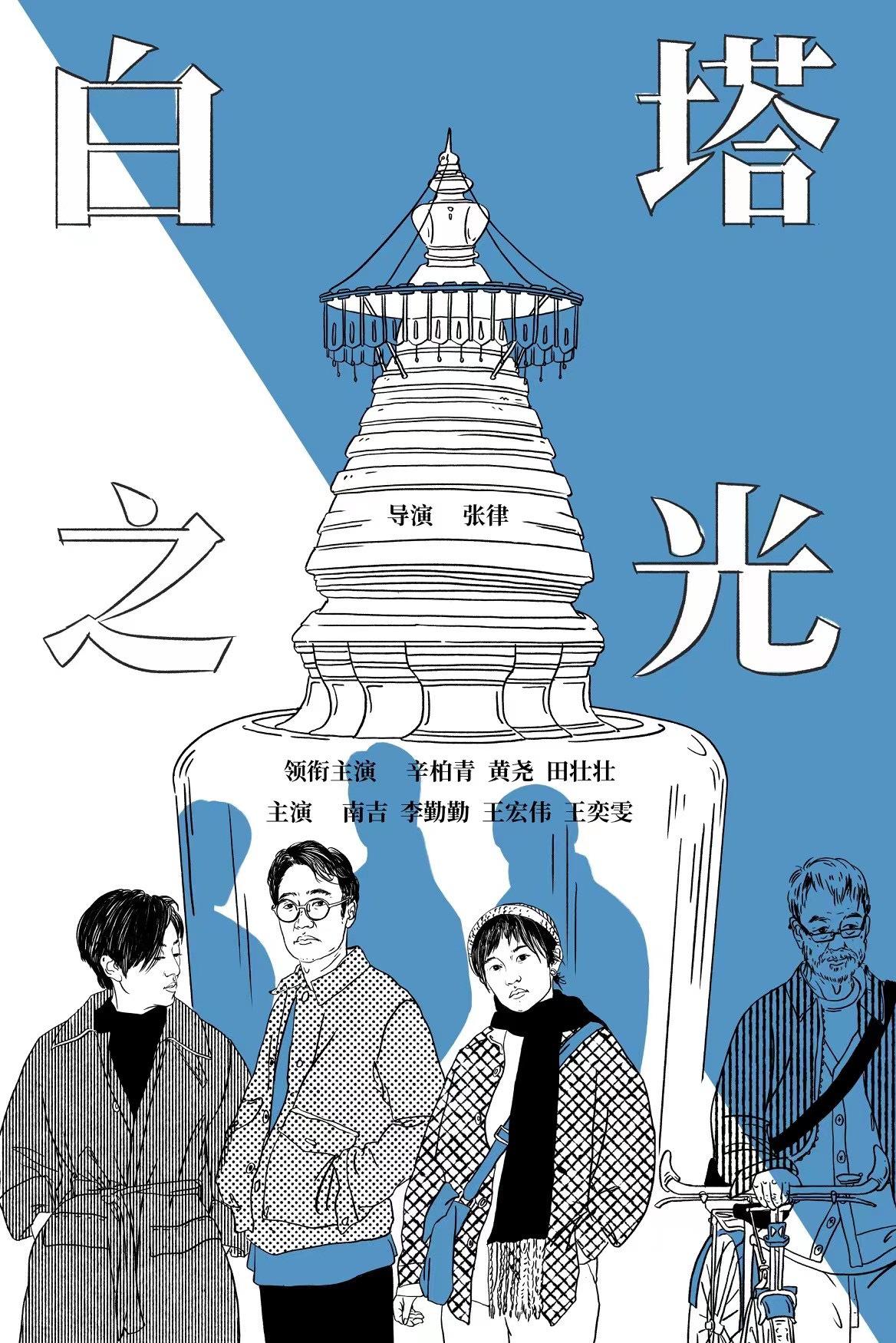
"The Light of the White Tower" poster
【dialogue】
My perspective may be an angle that Beijingers will ignore
Li Xun: Your previous stories were mainly about foreigners and people from other places, but this time you wrote about Beijingers. I think this is actually a process in which the personal expression of a middle-aged male director returns to himself more and more. In the past, when you took photos of foreign lands, you often focused on the "difference" between the characters and the environment, and you didn't aim to be "realistic" in the way of expression, so what the audience saw was actually something that externalized your self, but this time The story is set in Beijing, and the environment and characters become more familiar to the audience. I'm curious whether the personal things presented in the film are closer to your own experience? How do you think about shooting Beijing and Beijingers?
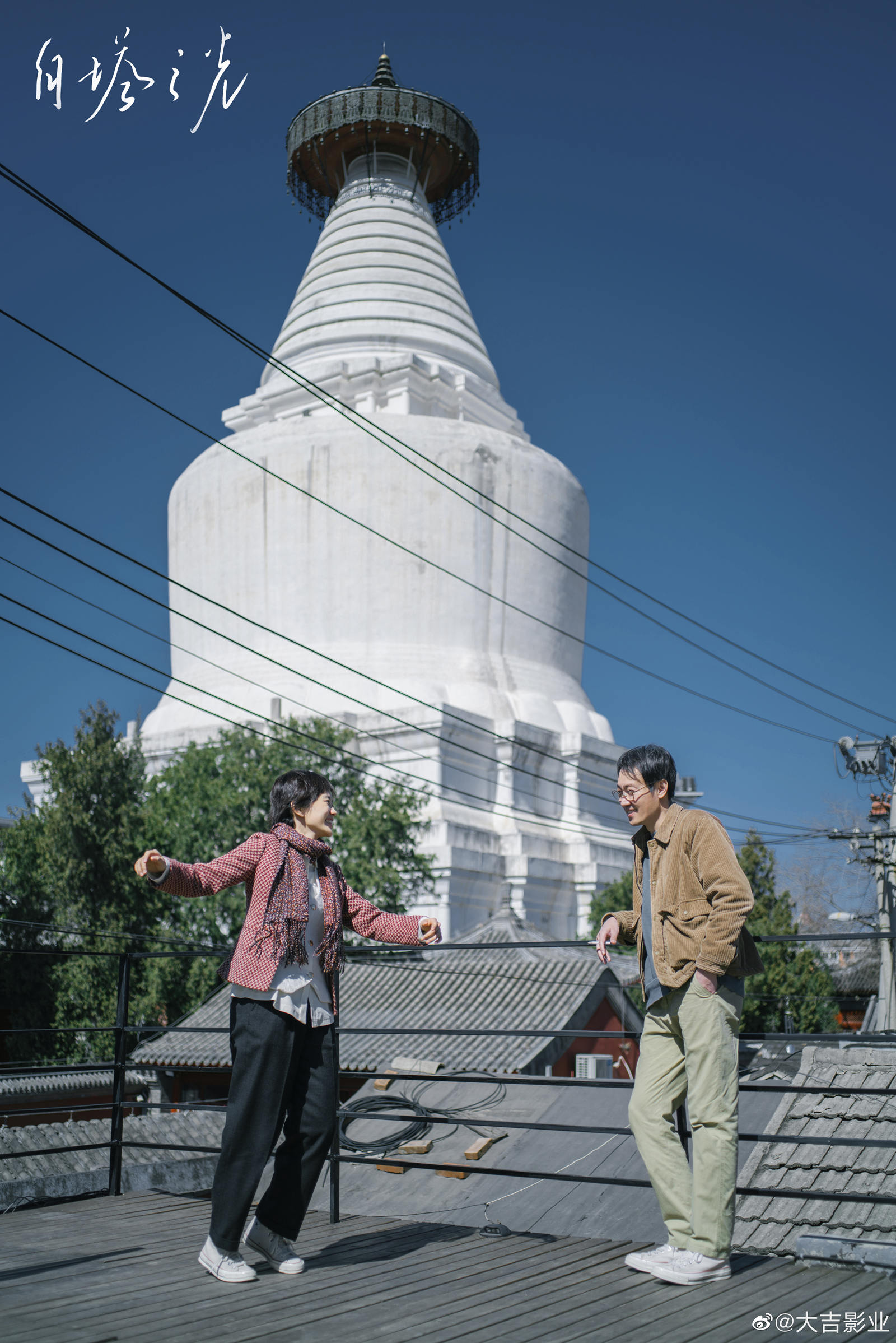
Stills of "The Light of the White Tower"
Zhang Lu: In fact, the city I have lived in for the longest time is Beijing, and my family has always been in Beijing. After a long time, I naturally became familiar with this place. But no matter how familiar I am, it is not my hometown after all, and there will be many places that make me suddenly feel strange. Therefore, I have always been sensitive to the space I live in. Beijing is not easy for me as an outsider to be numb. Beijing is very large, with many contents and rapid changes. Of course, the depth and breadth of what I see may be less than that of a pure Beijinger, but my perspective may also be an angle that Beijingers will ignore.
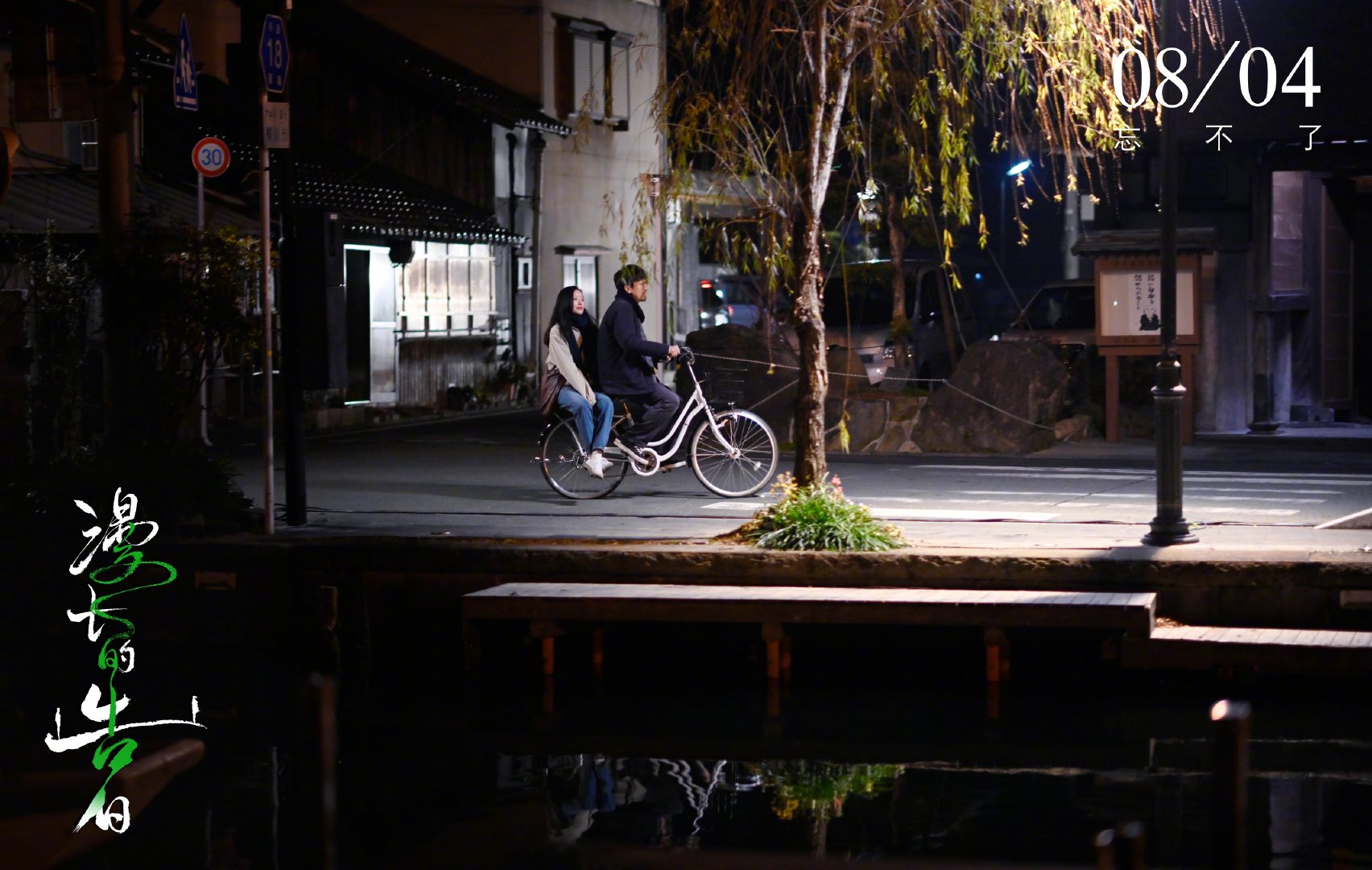
Stills of "The Long Confession"
This time I went to Japan to play "A Long Confession" (the international version is called "Yanagikawa"). They put this film together with "Fukuoka" and "Ode to the Goose" and called it the "Fukuoka Trilogy". During the post-screening exchange, they said, "We have lived in Fukuoka for such a long time, and I have been to all the spaces in your movies, but it is strange that what you filmed seems to be something we have never noticed. what I have lived before.” This is what I mean by the different perspectives of outsiders and locals.
Another thing is that my memories of Beijing accumulated in the 1980s and 1990s, and those memories set the tone for my impression of Beijing. In 1967 or 1968, I came to Beijing for the first time when I was very young, and then I came here one after another during elementary and middle school. Soaking. At that time, I felt that Beijing was still a "whole" thing for me, but after living for a long time, after leaving and coming back, I found that the "whole" was disintegrating, not to say that it fell apart, more It is the shape that is changing.
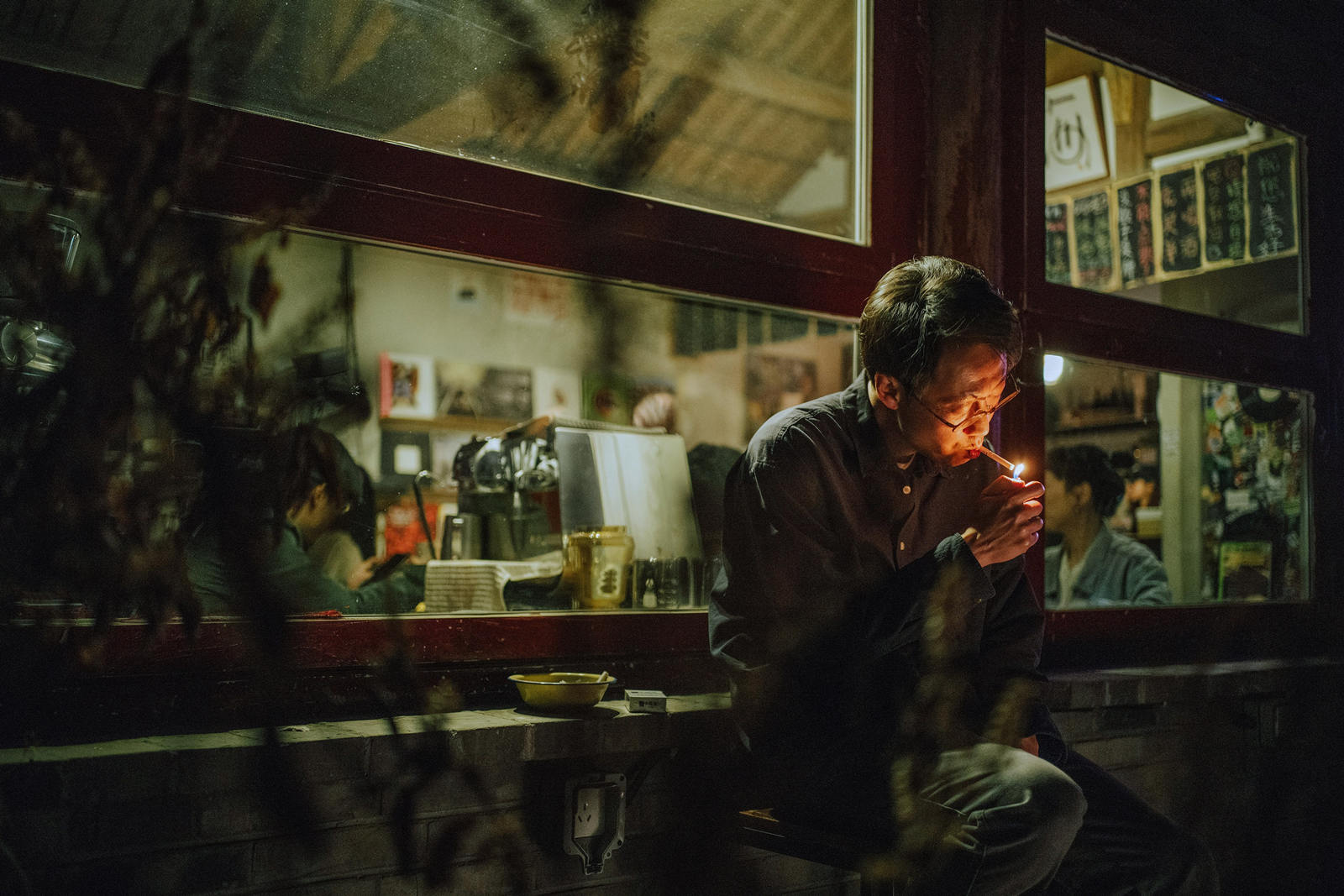
Stills of "The Light of the White Tower"
I wanted to shoot Beijing a long time ago, but at that time I was not sure about what I wanted to express, and even this time I was not sure about shooting "The Light of the White Tower". It’s just that when I was young, I often played in the area of Baita Temple and Xishiku, and I am more familiar with it. Before filming "Liu Chuan", a friend and I went to the coffee shop next to the Baita Temple—the location where Xin Baiqing and Huang Yao chatted on the rooftop—at that time I found that my impression of the White Tower was somewhat different from the past. changed. The buildings and streets in Beijing are basically square and well-regulated, and the order of space is very certain. But the White Tower deviates from the square rule, it is round and towering upwards, and the color of the White Tower breaks through. Gray is the basic color of Beijing, mixed with exquisite vermilion during the period, reflecting the difference in power structure. Between the calm gray and vermilion, you suddenly encounter a sudden mass of white. It is impossible not to affect your emotions. Even when you look at it when you are depressed, a little comfort will emerge spontaneously. I have been there a lot, and I am very familiar with the differences between morning, noon and evening, seasons, and rain, snow, and sunshine. That’s why I chose this area in Xicheng District for the first time I photographed Beijing. In that space, the sensitive things in my heart will have a foothold.
After filming "Yanagikawa", I returned to South Korea to teach for a semester. I came back in mid-September 2020 and was isolated in a hotel in Guangzhou. I have been to Guangzhou twice, but they were all superficial, but I know that Guangzhou is very lively, but I was locked in a hotel and couldn't get out, so "although it is Guangzhou, it is not Guangzhou". During that time, I suddenly remembered the Huatian Yanji cold noodles I ate in Xisi. Although "eat" is material, "want to eat" has some spiritual meaning, and I found that my emotions have changed. . I think my idea of "wanting to eat cold noodles" is too vulgar, and I try to suppress it, so I think of Baita all of a sudden, and want to use the memory of Baita to cover up my desire for cold noodles. I have nothing to do if I don’t go, so I wrote the script of "The Light of the White Tower" during the 14 days of being locked up. Longing, the status quo of being "shut down", and the appetite for Xisi Yanji cold noodles, in this way, the things to be photographed have almost been decided in a mess.
Li Xun: Why is the title called "The Light of the White Tower"?
Zhang Lu: The hotel where all of our film crew lived was called the White Tower of Light. It started from here, but of course I also have my own considerations: the White Tower and the square, regular, and determined buildings around it, as well as the basic colors mixed with gray and vermilion, have a very strong contrast. Look at it from a close distance, on a sunny day or on a cloudy day, the white tower will always be a light in such an environment. This is how I feel.
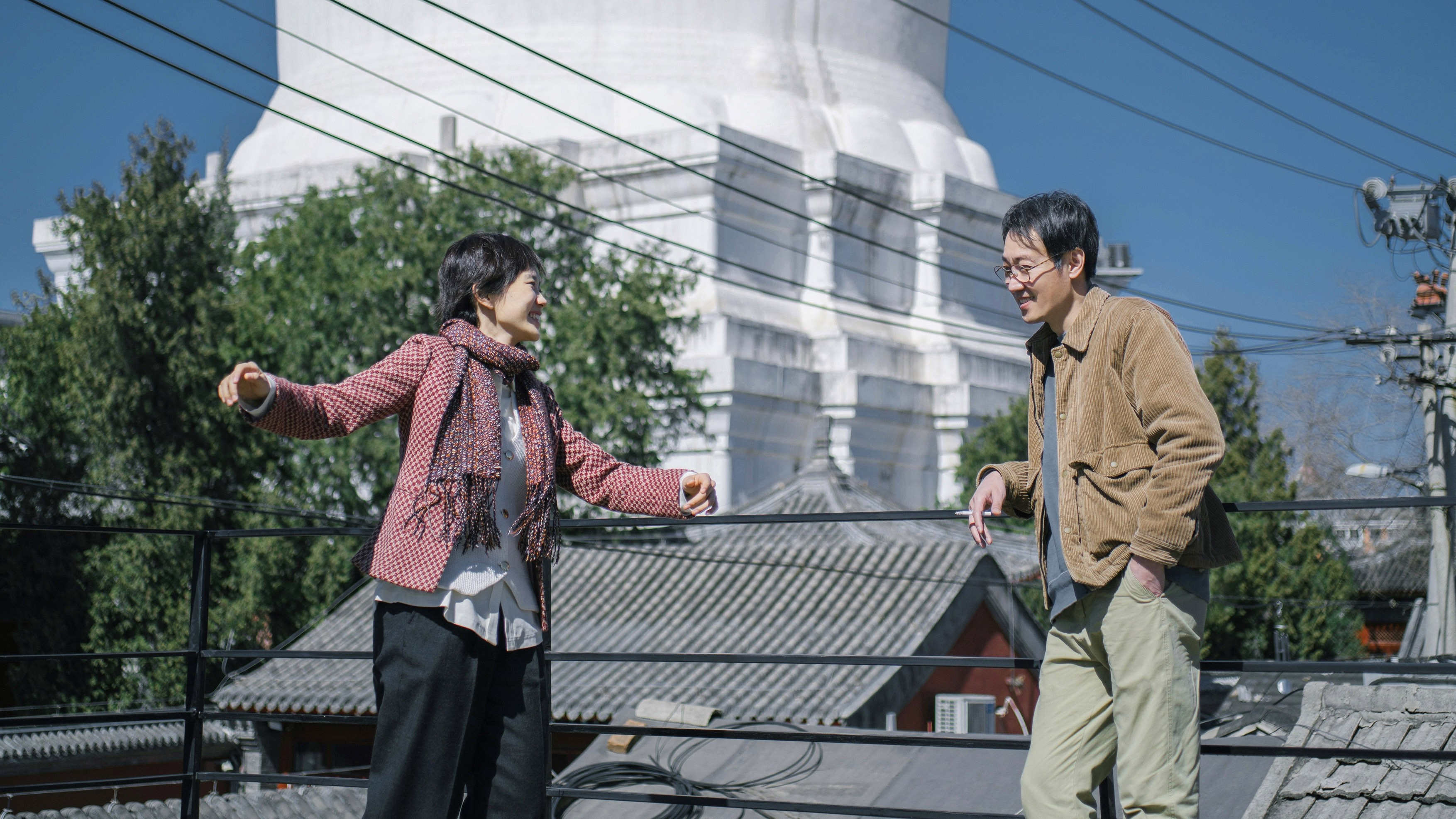
Stills of "The Light of the White Tower"
I am more interested in the emotional state of middle-aged people
Li Xun: For me, the first thing that comes to mind is the saying that the White Tower has no shadow. This is also mentioned in the video. The original meaning is that the shadow of the White Pagoda may be in Tibet, or it may be in your heart. I have extended this meaning a bit, wanting to say that whether a person is exposed on the outside or hidden in his heart, the light of the White Tower can illuminate the secret behind it. Take your story for example. The character is not fully revealed - what he says and does does not necessarily represent himself, and more essential things need to be revealed through film narratives. It’s like saying that if the audience has questions about the story and characters of the film, whether it’s about Gu Wentong, Gu Yunlai or Ouyang, if they want to guess what’s going on, it’s precisely the “White Tower of Light” that will Shine a light on that answer.
Then when it comes to the characters in "The Light of the White Tower", I want to talk about Gu Wentong. The interesting thing about his character is that he is a very typical middle-aged male character in China. To use two words to describe it, it is drifting and opportunism. Director Zhang Lu, what do you think of this character?
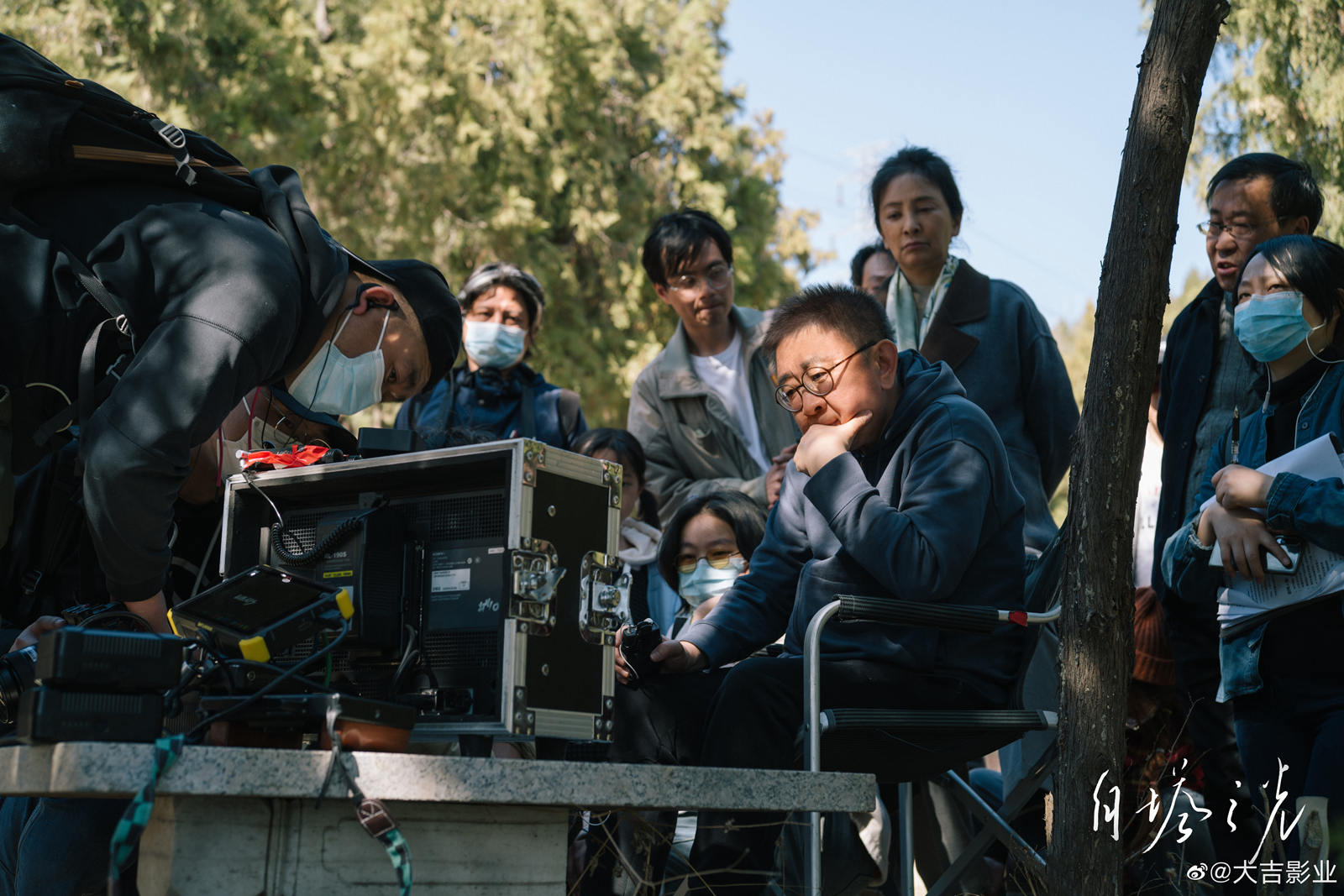
Zhang Lu on the set of "The Light of the White Tower"
Zhang Lv: I’m not sure when it started, but I became more interested in the emotional state of middle-aged people—the kind of state where you can’t see where you came from, and the future is unclear, hanging there, whether it’s physical or emotional. Emotions, some can't keep up. You say he wants to take a step forward, but if he doesn't, he is bound by many things in the past. Middle age is the most hesitant stage, you have to think about this, think about that, hesitate and stop. But when he really reaches the age of eighty, he will change his state, because he can really see the end point, and his body can more or less respond to that end point. And middle age is at a critical point. What I am interested in are those who are hesitant and hesitant in the middle age. They always have a sense of "outdated" and are not sure. In other words, eighty years old is a sure state.
This is the way Gu Wentong does things. No matter what he does, he is afraid of hurting the other party, and if he goes deeper, he is actually even more afraid of hurting himself. He used to be a poet. Although he gave up poetry after reaching middle age, the sensitivity of a poet still remains, so he is a bit twisted. Another major factor that caused him to be like this is the absence of his father. He lost his father when he was five years old. Generally speaking, the object that a boy will imitate intentionally or unintentionally when he grows up is his father. The father has a deeper influence on his son than imagined, so many men in middle age, when they meet their father’s friends, they will say, Why are you so like your father? But for Gu Wentong, he does not have such an object to imitate. In a sense, he is the shadow of his father, but this shadow has not had the light source since he was five years old. After this, his growth rhythm is different from that of his peers. The reason why he is interested in Ouyang is actually because there is a feeling of sympathy between them. I think that human emotions, why two people are good, must have something in common in texture.
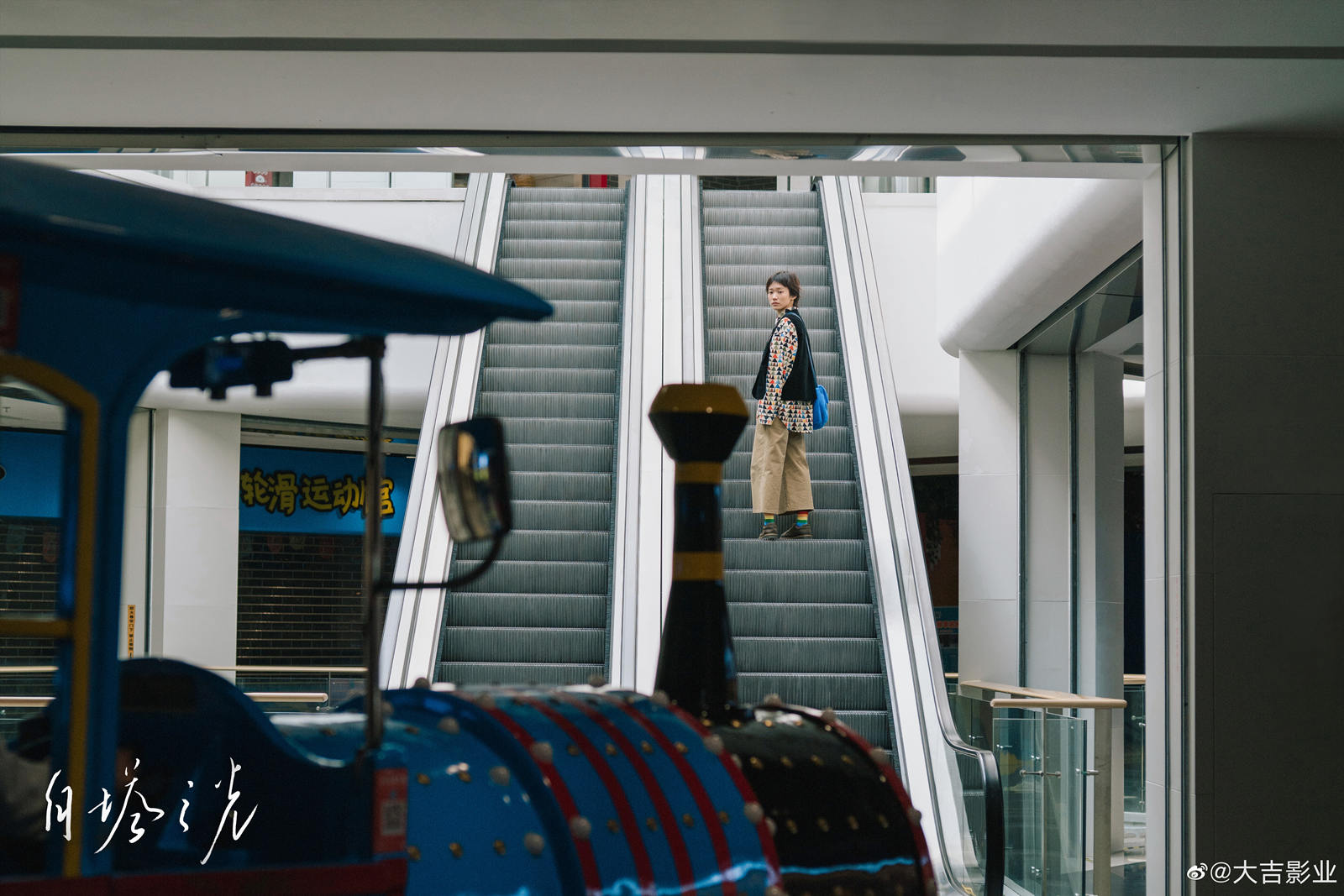
Stills of "The Light of the White Tower"
Li Xun: I found a change when I watched the film and compared it with the script. In the book, Ouyang Wenhui took Gu Wentong to open a room. There was a conversation that was originally designed to be on the bed, but now it was changed to Ouyang on the bed, and Gu Wentong sat on the ground at the end of the bed, creating a distance. Is this distance Gu Wentong pretending to be "sit in his arms" after he had no chance to succeed?
Zhang Lu: This was changed according to the scheduling of the space when we were filming. Gu Wentong was about to sit on the bed, but Ouyang suddenly said "I don't want to do that", and he slipped away (laughs). Even the appearance of sitting still is "disordered".
Li Xun: The main reason why Gu Wentong was disliked (including divorced) in the movie was that he was too polite. When people are too polite, it means that the relationship between the two is almost over. Can you talk about this "politeness"?
Zhang Lv: In fact, I lost my passion. Even quarreling is a way of expressing passion, but being polite is the complete disappearance of passion. The love between a man and a woman should be a mixture of love and hate—I’m not sure if it’s right—I think it’s the intertwining of “love” and “hate” that forms a “love.” But people like Gu Wentong are very sensitive. His sensitivity allows him to predict the ending sometimes. Even when he is moving forward, he is already preparing to retreat. He will not take a thing to an extreme. So "politeness" is also a kind of indifference in a sense, and Gu Wentong didn't want to turn this indifference into a kind of hatred, so when his ex-wife asked him if he cared about her cheating, he said he didn't care, he was totally Finding someone to go down the stairs for yourself, in the pretense of being afraid of hurting the other party, is actually afraid of hurting yourself on a deeper level.
Li Xun: Let's look at Ouyang Wenhui again. From the back to the front, the reason why she had such a relationship with Gu Wentong may be because there was an emotional gap after being dumped by her boyfriend. She is also a person with a high spirit, so she will choose to do something in this spare time. Just happened to meet Gu Wentong, such an attractive middle-aged man. There are also some lines that hint at another psychological root: Ouyang feels that Gu Wentong is very similar to her father.
Zhang Lv: Ouyang said "you look like a person" in the hotel. Gu Wentong asked who it was, but Ouyang didn't tell. The second time it was Nan Ji who said that the two of them were like father and daughter. The third time was when Ouyang was watching chess to make it real.
Ouyang's imagination of her father is unfounded. She may have been casting a father figure. "Maybe my dad has such virtues at this age."—She projected an unfounded idea of her own onto Gu Wentong. Why is she interested in a man of this age? "That should be similar to my father, or close to my father." This kind of imagination has been attracting her. In fact, Gu Wentong in the movie has no talent at all. Even his sister said to his daughter: "No one remembers your father's poems?" Obviously he is not a talented person, nor is he so-called successful. Ouyang Wenhui was attracted by his unique rhythm. In fact, if a person likes a person, his talent, social status, family background, and appearance will certainly occupy a certain proportion, but I personally think that as long as you don’t look for it very utilitarianly, people will eventually find someone with a comfortable rhythm. . So I think Ouyang and Gu Wentong are both. They each have their own rhythm. There are overlaps and differences between the two.
Gu Wentong included many things in it. So for girls who are more extroverted, or who pretend to be extroverted, he will be attractive.
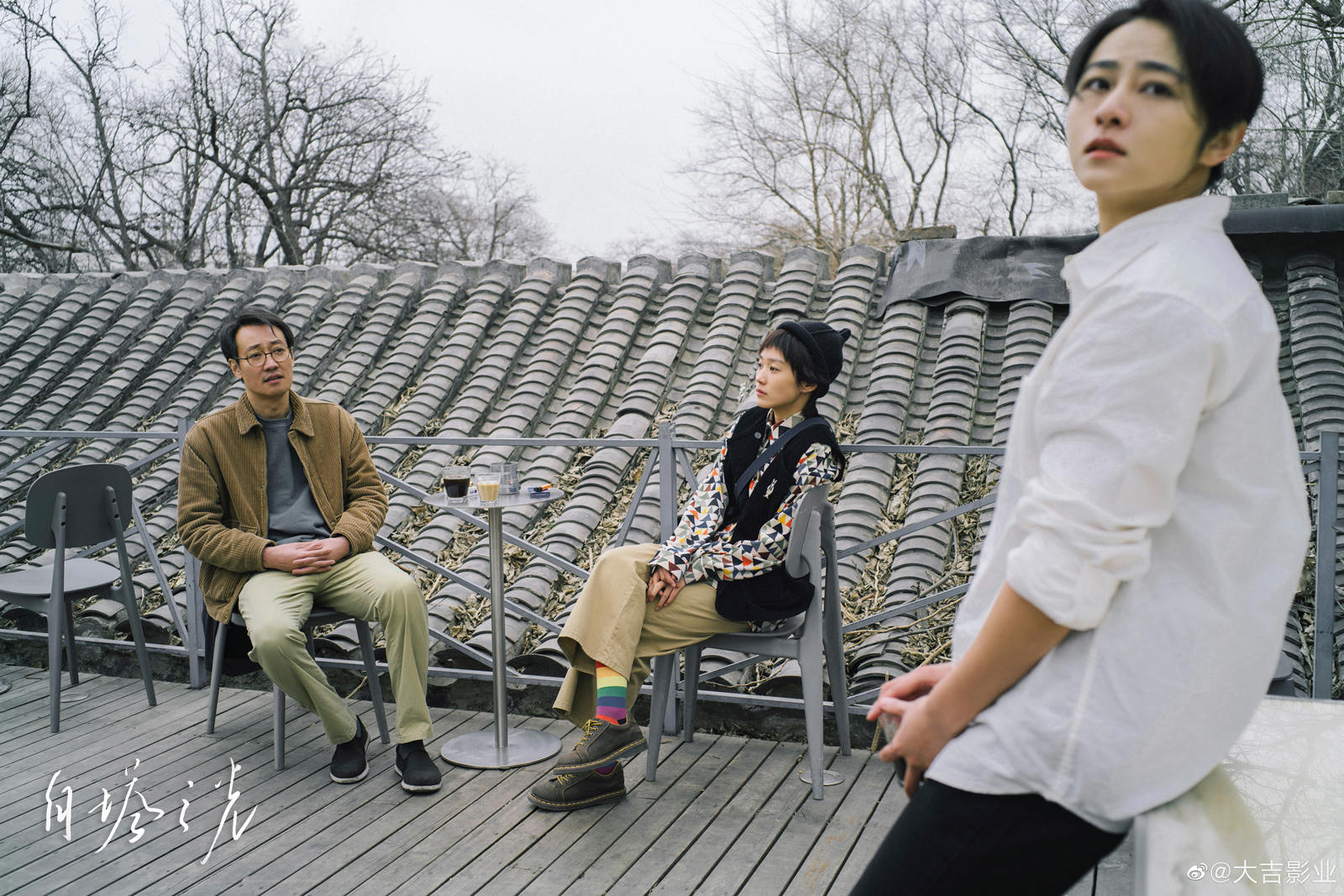
Stills of "The Light of the White Tower"
Li Xun: After Ouyang was dumped by his boyfriend, there was a gap in his emotional life. She will feel a little empty, and she has to find something to fill it up. Even if this person may not be ideal, but it can only be regarded as reluctant, she will still pursue and complete this relationship with 100% enthusiasm, no matter whether it is here or not. There is an element of self-construction or imagination. But once her ex-boyfriend changes his mind again, she will simply throw away this substitute and go back to her ex-boyfriend, even though he may be a scumbag. This is a common character bridge in literary and film works. And setting Ouyang as an orphan immediately established the psychological roots of her character. The absence of natural parents will always make people have an insatiable demand for family affection or intimacy in a broader sense. Therefore, Ouyang will have the mentality of being afraid of being alone and constantly pursuing emotions (or emotionalizing himself), and pretending that the person he likes is his imaginary father may be the most convincing to himself, although this is a bit "self-deception".
Zhang Lv: I think the inability to tolerate gaps in Ouyang you just mentioned, I think there must be, and it is the same in real life. And I think you are more like speaking from the standpoint of traditional virtues, and I think it is more complicated than that. why? Even if Ouyang has a boyfriend, when she meets someone like Gu Wentong, she will still approach him. Because this kind of feeling is not a clear love, but an inexplicable attraction, which is related to her lack of fatherly love, or it is precisely the rhythm of this man that attracts her.
In other words, there may not be a causal relationship between her ex-boyfriend cheating and her approaching Gu Wentong now. In the film, Ouyang's ex-boyfriend called and cried and said that she was asked to be the receiver. Gu Wentong said: "What did you say?" She said: "Fucking idiot, I agree." At this time, Gu Wentong's expression was changing. Ouyang Wenhui is an orphan, maybe in terms of her personality, even if she agrees to her boyfriend's suggestion to get back together, the two of them will be fine. There is something of destiny here. With her boyfriend, she never emphasized that she was an orphan. But she said to Gu Wentong: "You don't know what an orphan is." In my opinion, the relationship between Ouyang and Gu Wentong was not because she was dumped by her boyfriend. I even think that even if they are together, she may have an ambiguous relationship with Gu Wentong.
The relationship between father and son is actually a topic that I have always cared about.
Li Xun: The third one is the role played by Gu Yunlai and Tian Zhuangzhuang. The character of Gu Yunlai has undergone a lot of changes in the film: from the initial denial of being caught on the bus, he became less optimistic and even indisputable later. One aspect is his own changes, and on the other hand, his relationship with his son Gu Wentong has also changed. Perhaps compared with the relationship between the hero and heroine, there are more hidden elements between the father and son.
From the core narrative of the film, he forms a very important triangle relationship with Gu Wentong and Ouyang Wenhui. The film is obviously not just a story of father and son, but it is not a purely romantic story either. It is precisely because of the role of Gu Yunlai that the characters in the film have a stable structure like a white tower. How did you conceive of this character?
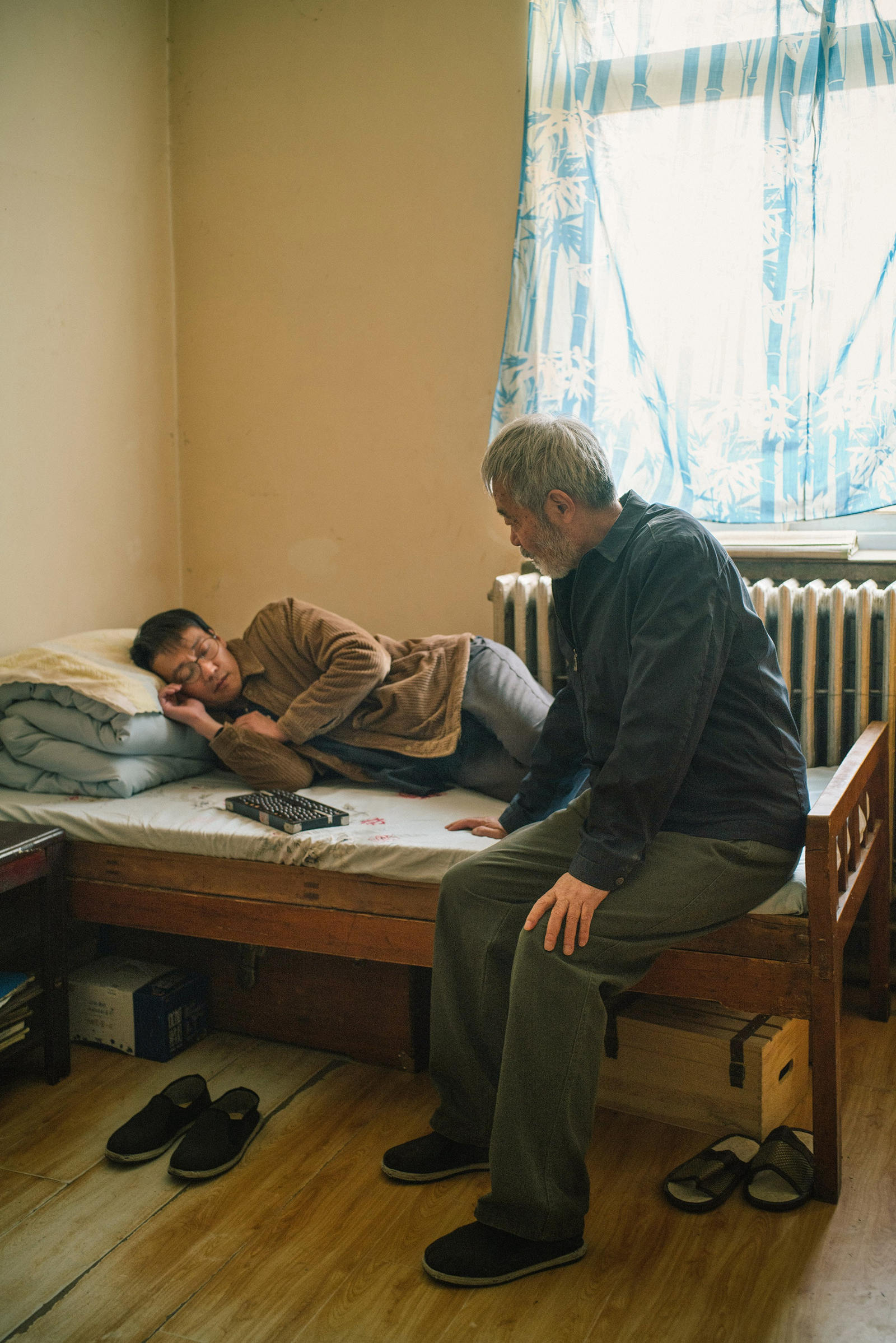
Stills of "The Light of the White Tower"
Zhang Lv: The relationship between father and son is actually a topic that I have always cared about. Because at our age, my father is very old, or has passed away. When I was writing the first version of the script in Guangzhou, I was imagining the role of father. Gu Wentong was born and raised in Beijing since he was a child. He traveled through the 1970s, 1980s and 1990s and witnessed the changes in Beijing. In a sense, he is a native of Beijing and has never left here. Gu Yunlai is a Beijinger who was expelled from Beijing in 1976, but in the decades since he left Beijing, he still misses Beijing. Of course, because there are his relatives and children in this space. In terms of setting, the son stays in Beijing while the father is expelled.
Among the friends around me, there are more fathers who run away from home on their own initiative, but few who are kicked out. What is the father-son relationship like in such a family? This has always been unclear to me, so I set up such a character. Gu Yunlai was born before or after the founding of the People's Republic of China, and the time is vague. He has a very strong brand of the times. When the reform and opening up was approaching, something happened to him and he left home, which meant that the entire reform and opening up of Beijing was vacant for him. He was also vacant throughout his son's upbringing. Even in Beidaihe, all his emotions still remain at the time when his son was five years old. All the things he cared about were left in Beijing, so when he lived alone in Beidaihe, he was out of the rhythm of the times.
Gu Wentong's mother did not appear in the movie, but in my imagination, she should be a relatively strong mother, just like the lines in the movie: The crime of molesting women is not as good as a murderer. His mother kicked his father out, the mother was the one to make the decision, and the father obeyed that decision and left. But I feel like the two are in some sort of unconscious complicity. At that time, what they wanted to protect most was their children. When I was young, this happened to a friend's father, and it made the whole family look down.
In fact, I am full of respect for Gu Yunlai's character. It doesn't matter if he drank or didn't drink, did or didn't do it. He encountered this matter in that era, and I think he is really a very powerful person for making such a decision. Ordinary people have to consider their own face, their own prestige, their own status in the family, or to be lowered to another level, and it is better to live than to die. However, Gu Yunlai in the movie really has a characteristic of abandoning himself. Although he is in a small family, his choice is to sacrifice himself. People like that always attract me.
Also, I don't know if my point of view will change when I get older—that is, in the image of my father, there must be sacrifices more or less. This idea can also be very decadent stuff. So on the other hand, if there is no such a father, maybe I would not shoot a middle-aged man like Gu Wentong. In the past, the middle-aged people in my movies left a familiar place and went to a strange place. The characters entered a new space with emotions, which resulted in changes. Generally, it is difficult to produce such changes in the space where one grows and lives. Therefore, in this movie, the father is a very important role, and he cannot do without his son. So many years have passed, but the emotion has not been broken. It’s like flying a kite. In a sense, the kite is the son. The father wants it to fly high, but the string of the kite is still in his hands.
When thinking about characters in movies, I always think of an old saying: There is no better son than father. This is a very old consensus among us, but there is absolutely no such contradictory statement as "knowing the father is not like the son". For children, the father is always a mystery that cannot be solved. But when the father looked at his son's every move, that little cleverness could see it all at once, right? He flowed from his father's blood, not backwards. So that is to say, the father is always a mystery to the son. In the end, whether it is a very close father and son, or a father and son who have turned against each other, or a father and son who have not been in touch for a long time like Gu Wentong and his father and have a huge gap, in the end, they must understand each other and even reconcile.
But is it possible to fully reconcile in the end? I think it is impossible. No matter how close the father and son are, or how distant the father and son are, or how much the father and son hate each other, I feel that a complete reconciliation is impossible in the end. But because of our blood relationship and our emotions, we still have to walk on this road of reconciliation.
I think how the world has changed, men can't be turned into water, women can't be turned into mud
Li Xun: In your films, it seems that the female characters are stronger than the male characters. For example, they are more active, more active, and even quarrel with the males, or they are not weaker than the males in intelligence and wit. Is this intentional? Or do you always have an ideal woman in your heart like Russian writers?
Zhang Lv: One comes from life. The women around me—my mom, my sisters, and some women I know—I feel tougher and broader than men. Since I was a child, I have had a very strong prejudice: strong and kind, and I always feel that women are closer to these qualities. Another thing is that I have always been influenced by Cao Xueqin in my views on men and women: women are made of water, and men are made of mud. I think that on the most fundamental issue, Cao Xueqin has already said it and solved it. I think how the world has changed, men can't be turned into water, women can't be turned into mud. Of course, women also have many different situations, but in terms of probability, or in terms of our emotions, because women are more delicate, they will go more emotionally, that is to say, she has a natural maternal love.
Li Xun: So the director also looks at women from the perspective of traditional virtues.
Zhang Lu: Yes, I am sometimes "avant-garde" and sometimes very traditional (laughs).
Li Xun: As far as Ouyang is concerned, even if she can see clearly the future between her and Gu Wentong, will she still spare no effort and devote herself to this relationship? In other words, in terms of temperament, is she a moth to the flame, or is she pretending to be foolish while pretending to be clever?
Zhang Lv: I think both Gu Wentong and Ouyang Wenhui have shortcomings. That is, people who have no object to imitate.
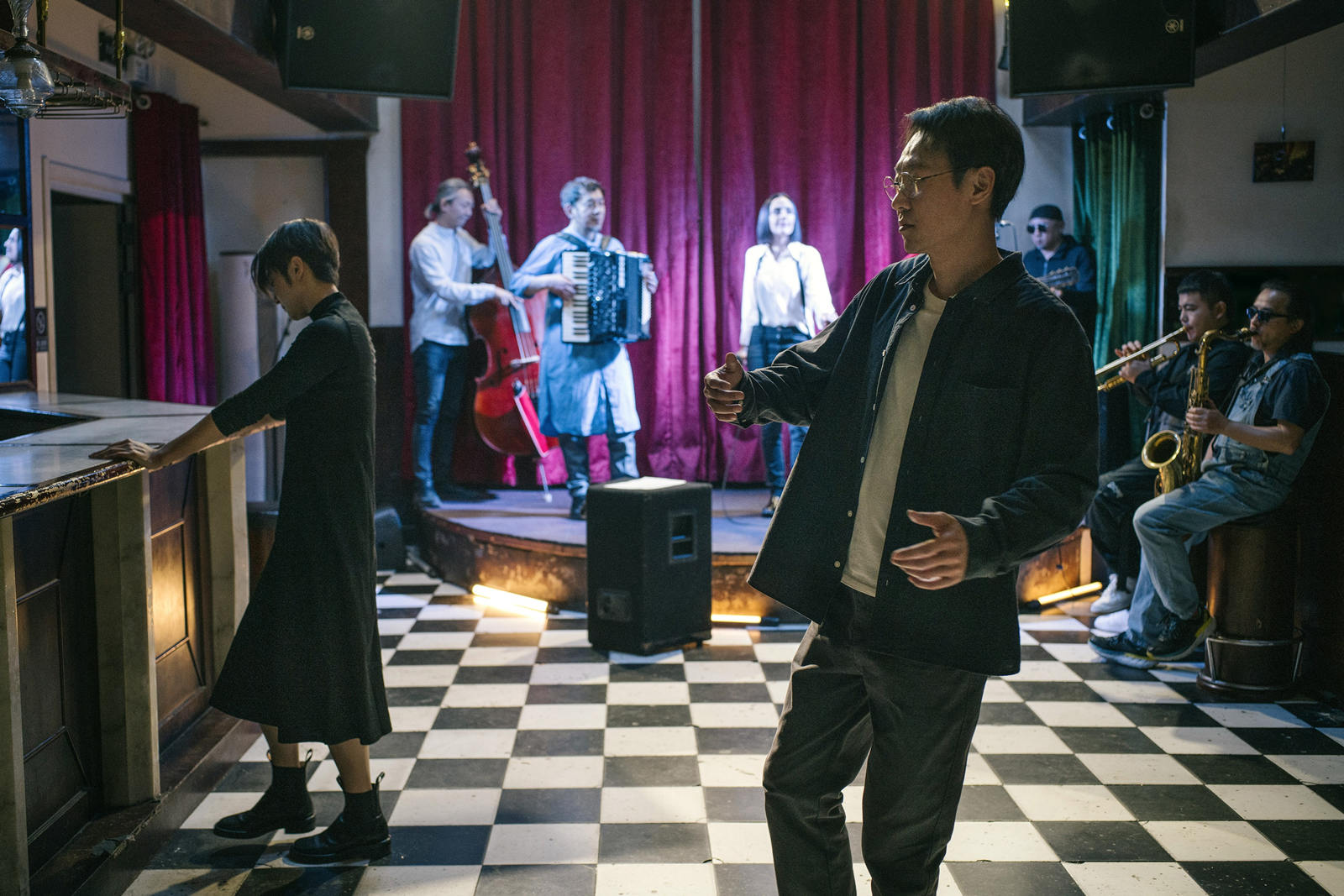
Stills of "The Light of the White Tower"
Li Xun: To put it in a very simple and blunt sentence, aren't they the same? Why do you say that Ouyang is better than Gu Wentong, or at least in your writing, you think it is better?
Zhang Lv: The relationship between the two of them did not come to an end in the end, or they slipped out in the end, which is called "don't hurt each other". But in the relationship between men and women here, a man must be firm - of course, I don't know if this is true - if a man is firm, a woman will sometimes even fly moths to a flame, and a woman has courage and dedication . Men are generally not firm, or pretend to be firm. Gu Wentong simply didn't even pretend. If he is firm, then the relationship between the two of them will change, and there may really be a kind of love. Of course, it's hard to say what will happen in the end, but that process is a burning process. But Gu Wentong always hid in a damp place, unwilling to be set on fire. For the role of Ouyang, I think she actually possesses this thing, but she is very sensitive to find out that her ex-boyfriend cheated on her, and the man in front of her is not very good. The role of Ouyang does not follow the trend like Gu Wentong, she is still determined to move forward, otherwise she would not take Gu Wentong to that hotel. From a certain point of view, it is Ouyang who is leading the relationship forward. Instead, Gu Wentong was shy and passively followed her.
So I quite like Ouyang's character. As soon as she saw that this man was a cowardly character who didn't dare to take a step, then forget it. In a sense, the same is true for Achuan in "Liu Chuan", the initiative is still in his own hands. When a woman's initiative is in her own hands, she is more powerful than a man. It's not that this man is not attractive, both of them have charm, but in the charm, women are more powerful.
Li Xun: Sudan in "Fukuoka" or Ouyang Wenhui in "The Light of the White Tower", which one do you prefer?
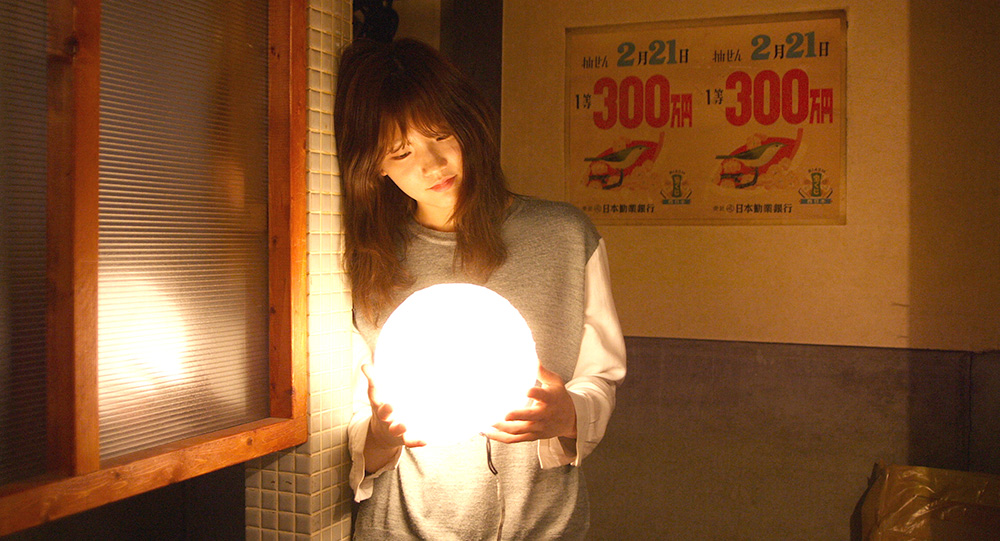
"Fukuoka" stills
Zhang Lv: Can I like them all? (laughs) I don't really like the so-called pure virtue of goodness that we have molded. Any quality depends on what kind of environment, what kind of era background, what kind of family, and what kind of characters are placed on it. The women and girls I see now are people like Achuan, Xidan, and Ouyang. They control their own rhythm and are very attractive. On the contrary, I don't really appreciate those who bear the humiliation, or the so-called most reliable women in the minds of men. Men themselves are unreliable, why force the other party to be reliable? Look at Sudan, Ouyang, and Liu Chuan. In the traditional sense, they are also unreliable people. It seems that I am one of the more out-of-the-box people.
Li Xun: You often say that your creation is triggered by space. In addition to the image of the light of the White Tower you mentioned just now, what is the relationship between the White Tower and the urban space of Beijing that you want to photograph?
Zhang Lu: When photographing this space, I myself had a strange, instinctive vigilance. When I take pictures of Beijing, I just can't take pictures of the Beijing that everyone already has in their minds. This is actually very strange. Many images of Beijing in our minds are very conceptual, or make Beijing very small, or make very rich things very narrow. This is what I am most afraid of. I was photographing Beijing, but I tried to forget about Beijing. When I photograph Beijing, I am photographing Beijing in the whole country, Beijing in the world, or a changing Beijing, that is, a less monotonous and less conceptual Beijing.
Because it was filmed near Baita Temple, the audience would definitely think that Gu Wentong was born here, grew up here, or even was born in a nearby hospital. So I assumed that he was born in an affiliated hospital of Peking University next to the Baita Temple, a little to the east of the Baita Temple, and the White Pagoda can be seen from the second floor of the hospital. This hospital is also the hospital where "Yanagikawa" was filmed, and it is a very old building. Then I thought, he was born here.
Li Xun: There are some scenes that express spatial relationships that seem familiar, and have appeared in your previous films. For example, the scene where the White Tower and the characters coexist is a bit like the relationship between the TV tower and the characters in "Fukuoka". No matter which street the character walks on, he can see the White Tower when he looks up, or there is always this tower in the background. There is also the relationship between the Yanagawa Japanese restaurant in this film and the director's last film "Yanagikawa". In addition to these "extroverted" relationships, there are many "introverted" corresponding relationships in the film structure. For example, there is a Ping An tree in the respective homes of the father and son, there are two Wenhuis with the same name, and the backs of the two hands also have blood vessels like earthworms. And so on for similar details. This detailed correspondence between the two spaces seems to have become the stylistic signature of your filmmaking.
Zhang Lv: Of course there is a larger structural change or difference, which is the space of Beidaihe.
Li Xun: Not only the space in Beijing.
Zhang Lv: Yes, I was afraid of getting stuck there. Of course there is a great correspondence with the environment. I also imagined Gu Wentong's and Ouyang Wenhui's residences, their living circles and their correspondence. But then I managed to get rid of this correspondence, or in a broader sense, formed another correspondence. Gu Wentong is a native of Beijing, so his living space should be explained in more detail. And the choice left a blank for Ouyang Wenhui.
During the stage of script development and scene scouting, we had already found a home for Ouyang, but all of them were removed later. I think it's best for Ouyang to come without a trace and go without a trace. Without giving her any definite explanation, this person would appear and disappear suddenly, and then slowly explain her status as an orphan. In the film, the place where her orphan status is revealed is not the orphanage in Beidaihe where she grew up, but an orphanage in Chaoyang District, Beijing. In other words, she often goes to this orphanage not because she grew up here, but because her heart has been living in a broader "orphanage". She's just a homeless person, and I left that out on purpose.
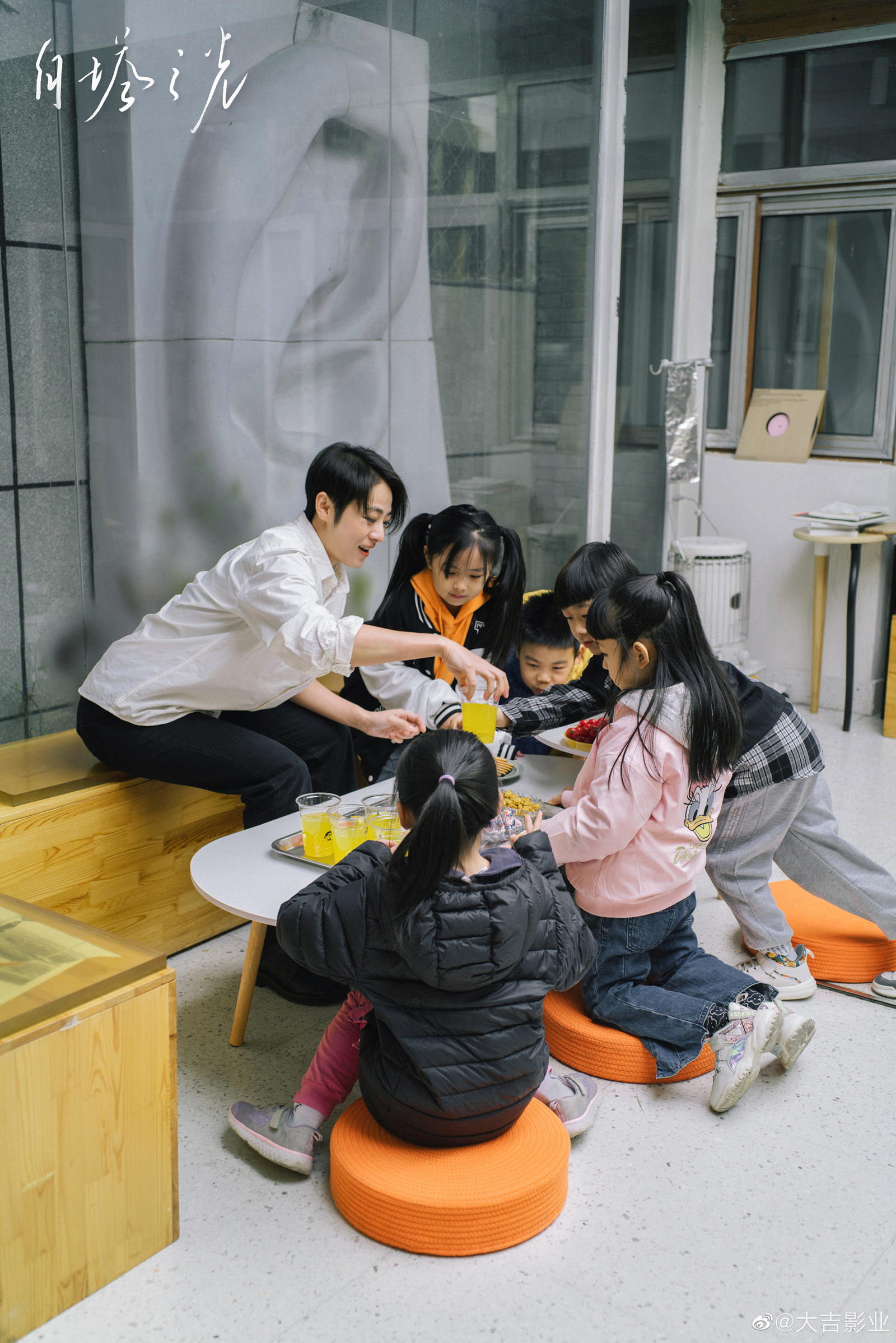
Stills of "The Light of the White Tower"
Instead, I went to wonder where Gu Wentong's sister (Gu Wenhui) lived. After much deliberation, I decided that the Wangjing area was the most suitable. I am very familiar with that space. Our filming location was the community built during the Asian Games. I chose that place for two reasons: one is that SOHO can be seen from its windows, and we have specially provided an empty mirror. The building of Wangjing SOHO is an oval. This relationship between this emerging circular shape and the old white tower is very interesting. The elder sister has come out of the alley and lives in such a place, while the younger brother still lives in the bungalow in the alley left by his mother.
His daughter was adopted by his sister, and he took her to read poetry there. The oval-shaped SOHO outside can be seen from the window sill. Although his daughter lives in a new Beijing space, there is also a round thing outside. Round and circular, but there is a variation between them.
The strange thing about people is that when you are looking for differences, you really need some kind of similarity. Similar things collide but are not the same, it is between this relationship, or between two spaces, that will have an effect on our emotions. There are many times when the movies we see are transferred from one space to another, they feel abrupt and broken, which means that there is no internal relationship between the two spaces. There is no relationship between the two spaces, in fact, there is no relationship between emotions. When two spaces are different and have the same place, their emotions are related, and this emotion changes.
So when looking for a location to shoot, I look for places like this. For example, the bar that Gu Wentong and Ouyang Wenhui went together is a gathering place for young people who love to drink in Beijing. It is called Jumping Sea Tavern. After they came out of the bar, they walked past an empty screen wall, and Gu Wentong found a payphone. This public phone booth is also real.
Another thing is that the street I chose is Ping'an Street. When Beijingers look at the screen wall, they know that it is Ping'an Avenue. On Ping'an Avenue, he called his father, which meant that the appearance of Ping'an Avenue was related to his father. His father's heart was their safety, and his room had the same peace tree as his father's room. For Beijingers, it is easy to associate Ping An Street with Ping An Tree, but it doesn’t matter if they don’t. Why? Ping'an Street is a very wide street. Although it is very wide, it has a close relationship with people. Unlike Chang'an Avenue, it is wider, but it seems to have a distance from people. It's okay to get drunk and walk crookedly on Ping'an Avenue, but it's weird on Chang'an Avenue. So this kind of connection with his father, the relationship between the space and the emotions of the characters, and the spatial distribution in the overall movie need to do this homework. When these details are organically connected bit by bit, the space is not conceptual or rigid.
Li Xun: So the similar or corresponding things you mentioned actually arouse a kind of emotional comparison, comparison and connection.
Zhang Lv: Or in other words, only by finding a suitable and connected space can the emotion flow.
Li Xun: In "Liu Chuan", Xin Baiqing played the role of the elder brother. "The Light of the White Tower" is the second time you have worked with him. What qualities about him attracted you? Ask the director to talk about the creative vision of casting.
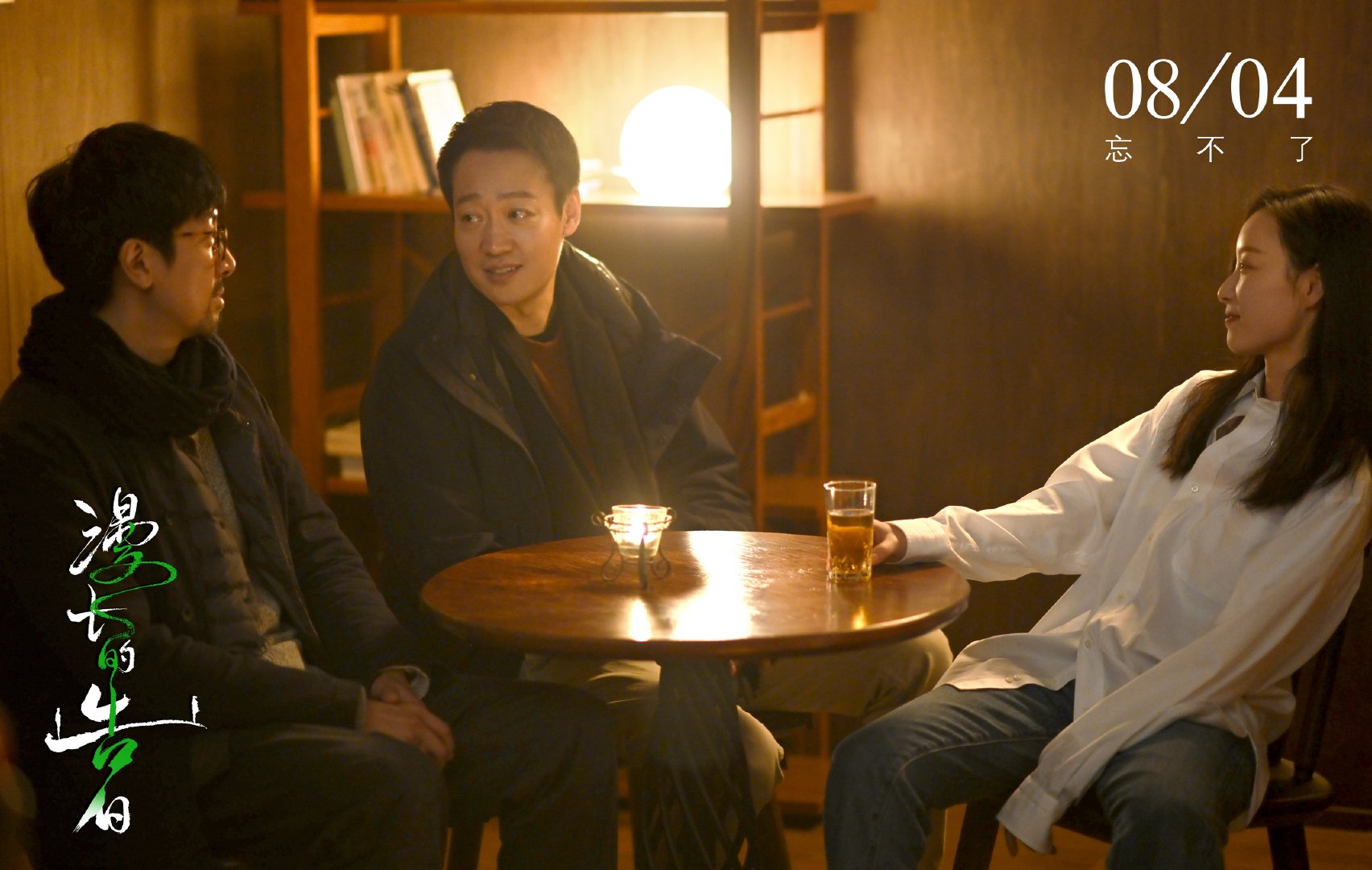
"Long Confession" ("Yanagikawa") Stills
Zhang Lv: Xin Baiqing is from Beijing. I think he has the unique rhythm of Beijingers. He looks gentle and gentle on the surface, but in fact he is also very strange and has his own rhythm. If you meet and chat with him for a while, he must be the gentlest and most gentlemanly kind, but if you have a deeper chat with him, you will find that he has his own taste and is very persistent. Also, what I like about him is that he is not in a hurry. Actors are generally more ambitious than ordinary people, but he doesn't care, he has a calm look, maybe this is what makes Beijingers so good: whoever you love, I have my world, I have my fun. In a sense, he is not utilitarian, which is also a very strong persistence. I thought it would be no problem for this person to play such a Beijinger.
The role of Huang Yao, because she is from Cantonese, so I changed her role setting to a person who grew up in Guangdong after I decided to cooperate with her. She spoke Cantonese with her parents, and also with Xin Baiqing on the bus. She satirized Beijingers: "Do you think that only you Beijingers can speak Mandarin? We Cantonese can speak Mandarin and Cantonese Cantonese." Huang Yao has the softness of a southern girl and the sass of a Beijing girl, a mixed charm. Also, there is a natural sense of balance in her body, as long as she moves, she will bring out a beautiful rhythm.
Beijing is now not the Beijing of Beijingers, but the Beijing of the people of the whole country. In the past, it was a bit like the Beijing of Beijingers, but now this thing is getting weaker and weaker. Of course, there are also tenant male models living in Gu Wentong's house, who come in to break through this geographical boundary. Brother-in-law Li Jun was set as a Beijinger in the original script, but Wang Hongwei is from Henan. I think that in real life, the family structure of contemporary Beijingers has also changed. After Wang Hongwei joined, he also brought humorous elements in Henan language and facial expressions to the film, which I like very much. After entering the Beijing family, Gu Wentong's daughter Xiaoxiao has been imitating her uncle's words, speaking Henan dialect.
Finally, there is the issue of casting the role of father. From the very beginning, I thought Tian Zhuangzhuang was right. Although he is a very famous director, his performances in the few movies he starred in were incomparable. We joked that it would be too much for a professional actor to cooperate with Tian Zhuangzhuang. It's a disadvantage, as long as he stands there, it's a play. When my daughter found out that I was going to work with Tian Zhuangzhuang, she told me that although she had never seen Tian Zhuangzhuang in person, every time she saw him in photos or videos, she wanted to cry. In fact, director Tian Zhuangzhuang himself is a very wise and humorous person, but why would he make a stranger want to cry? This is his charm, which brings a natural sense of compassion to people, so Gu Yunlai must be him!
Li Xun: Yes, I feel a little wronged.
Zhang Lv: That is, the kind of person who is born to make people sad. After all, Gu Yunlai's past is a mystery. He can't tell whether it's true or not, and he can't explain the heart-wrenching and tearful feeling in him. It's a kind of mystery, that is, I What it said: The father is a mystery.


